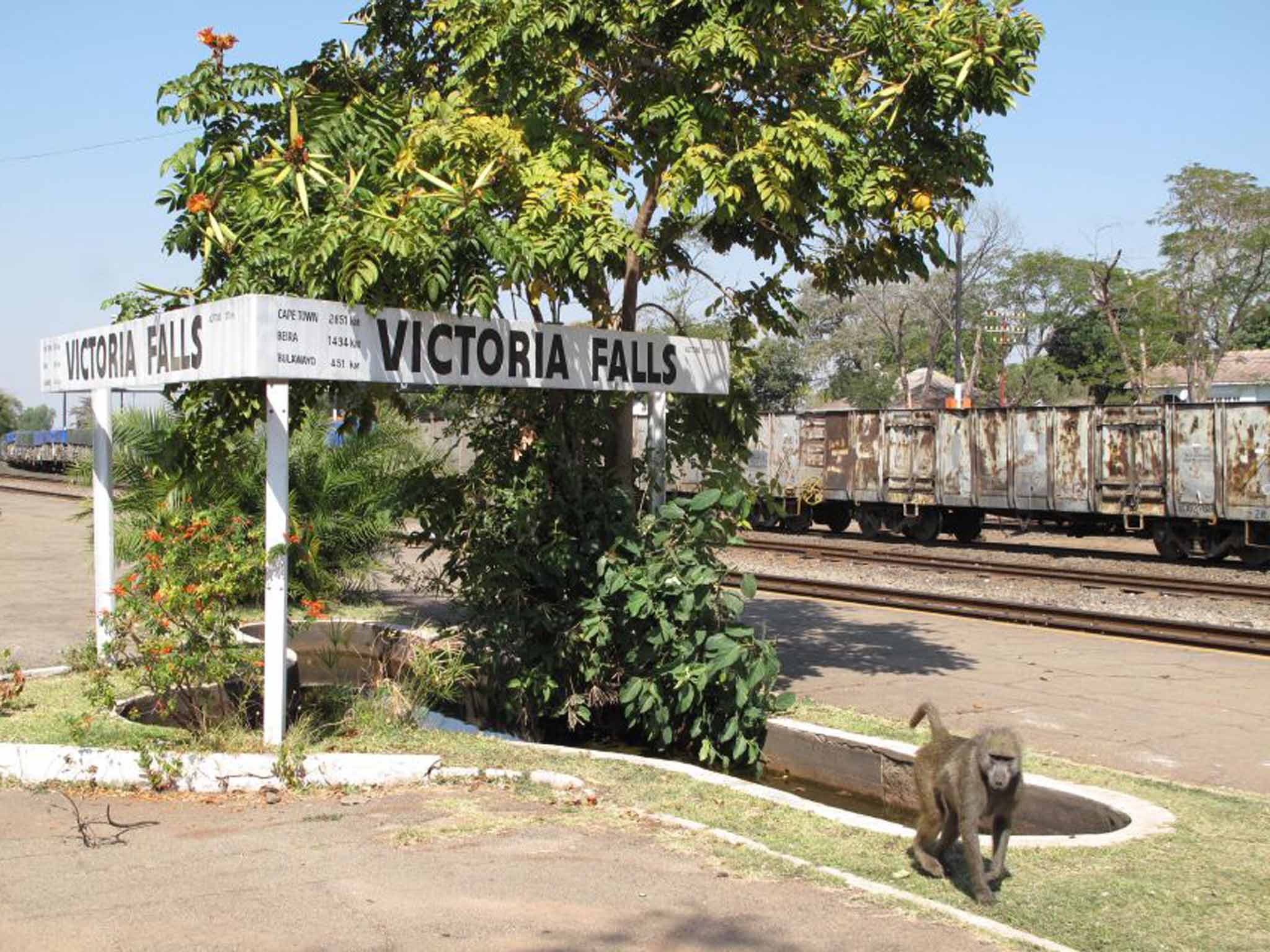Simon Calder: Monkeying around with the railways
The man who pays his way

As the baboons frolicked on the tracks at Victoria Falls station last Monday morning, I asked the Station Master what time the overnight train from Bulawayo might arrive.
"Eight? Ten? Nine?" he approximated, non-sequentially. The train finally grumbled to a halt at 11.30am, the Economy-class passengers having enjoyed 16 hours of rail travel for the equivalent of £5.
Victoria Falls is where Zimbabwe, Zambia and the Zambezi converge, making it probably the highest-scoring location on the planet in geographical Scrabble. The international frontier is halfway across a bridge built by men from County Durham in 1905. The structure is strong enough both to serve as the most spectacular bungee-jumping location in the world, and to guide freight trains loaded with hundreds of tons of Zambian copper across the river. Yet this southern African junction is not a brilliant place for rail travellers with a predilection for predictability. Anything from primates to presidential decrees can interfere with the smooth running of trains.
Travel in the developing world can feel constantly bemusing. Yet I felt well prepared for travel in a region whose infrastructure is based upon decrepit ironmongery, poor management, well-meaning frontline men and women, and luck (most of it bad), because my journey began on the London Underground.
The Tube is now helping travellers acclimatise to tropical travel – and the heat, crowds and uncertainty that characterise it. Thirty-six hours before I met the Station Master, I was one of hundreds of people crammed along the platform at Piccadilly Circus. The Piccadilly Line is the main public transport link to and from Heathrow, Europe's busiest airport. London Underground marked the hottest and busiest Saturday of the year with the traditional summer ritual of Signal Failure at Acton Town. Trains every two or three minutes dwindled to two or three trains an hour.
Now, on a network that has just celebrated its 150th anniversary, you expect things to go wrong. What counts is the response. The obvious first step to ensure everyone got their flight was to urge Heathrow-bound passengers to re-route themselves via Paddington and the Heathrow Express. However, this would have put business in the hands of the Tube's arch-rival. Instead, the chimps who run the Tube promised that, in six minutes, a train would arrive, destination Heathrow. Ten minutes later, one arrived, destination Rayner's Lane.
"Heathrow passengers can take this train to Acton Town and change there," the announcement invited. Imagine our delight when the train squandered more precious minutes at Hammersmith: "This train will be held here for a short time to even out gaps in the service". When it finally stuttered west on the slow line, it was overtaken by a train speeding straight to the airport. The map of the Tube suggests such an event is as unlikely as a particle exceeding the speed of light, but there are a few locations where one train can overtake another on the same line – though heaven knows why someone thought this a smart idea.
Hot and bothered
At Acton Town, we finally squeezed aboard a train with "Heathrow" on the front, and the Underground uncertainty principle reached new heights of bemusement. "This is a Piccadilly Line train to Heathrow Terminal 5," announced the mellifluous automated woman. "This train is terminating at Hatton Cross," responded the baritone driver on the public-address system.
Of course, everyone was turfed out at Hatton Cross, one stop short of the airport. The train idled for 10 minutes, blocking the line platform to all following services. Someone in a London Underground office safely away from the travelling public presumably gets paid for masterminding this mayhem. In contrast, the friendly Station Master at Victoria Falls is one of many public-sector workers in Zimbabwe with no idea when, or whether, their wages will next arrive, as the nation's economy disintegrates. The passenger is left hot, bothered and guessing, while a plaque at the station commemorates the visit several years ago of a despot who has wrecked the transport system (to be clear, that's Zimbabwean dictator Robert Mugabe, not Boris Johnson, the Mayor of London).
Going, going …
At Britain's main holiday airports, the biggest crowds of the summer are yet to come. I asked Gatwick, Manchester and Stansted for forecasts of their busiest days. Gatwick has just ended the biggest week in its history, but an even busier one begins today. Between 26 July and 1 August, an average of 50 passengers are expected to fly out every minute. Manchester's busiest day, both outbound and inbound, is not expected to be until 29 August. Stansted peaks next Friday, 1 August. The UK's biggest budget airline, easyJet, hits its outbound peak on 8 August. Which happens to be when I shall arrive back at my desk, but with a different outlook.
Ben Ross, Head of Travel at The Independent, has evidently had enough of listening to stories, as interminable as they are implausible, of railway mishaps and hitch-hiking misadventures. Ben is sadly leaving after many dedicated years as a brilliant Station Master for the travel desk, during which he created The Independent Traveller as it is today – National Newspaper Travel Section of the Year, for the second year in a row. We wish Ben well. He will be much missed, but I am delighted to say that Sophie Lam takes over as Head of Travel.
Subscribe to Independent Premium to bookmark this article
Want to bookmark your favourite articles and stories to read or reference later? Start your Independent Premium subscription today.

Join our commenting forum
Join thought-provoking conversations, follow other Independent readers and see their replies